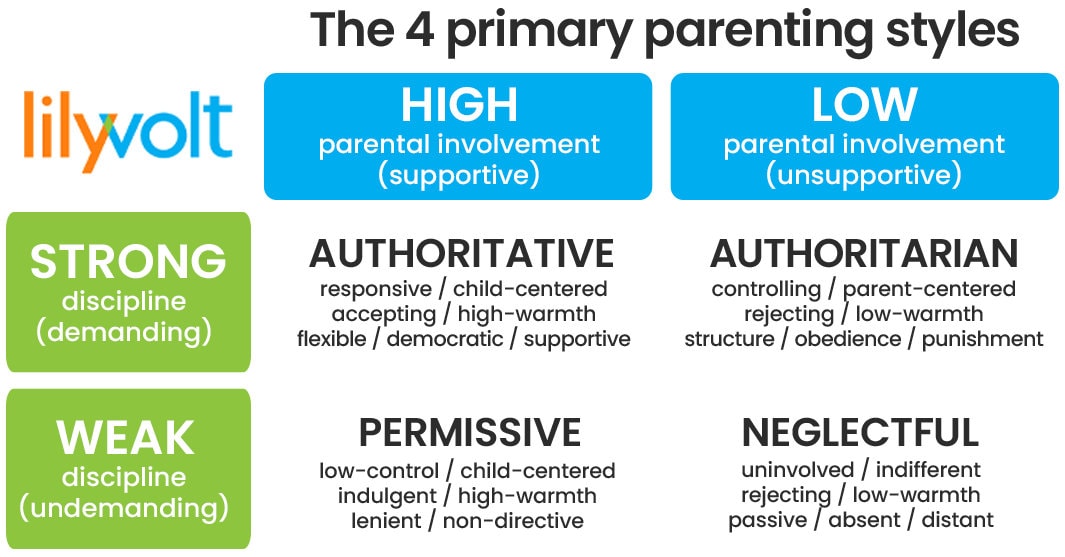Developmental psychologists have been interested in how parents influence the development of children’s social and instrumental competence since at least the 1920s.
One of the most robust approaches to this area is the study of what has been called “parenting style.”
Here, find out about the four primary types of parenting, as well as their potential impact on kids.
Parenting styles defined
Parenting is a complex activity that includes many specific behaviors that work individually and together to impact the life of a child. Although specific parenting behaviors — such as spanking or reading aloud — may influence child development, looking at any specific behavior in isolation may be misleading.
Many writers have noted that specific parenting practices are less important in predicting child well-being than is the broad pattern of parenting.
Most researchers who attempt to describe this broad parental milieu rely on Diana Baumrind’s concept of parenting style. The construct of parenting style is used to capture normal variations in parents’ attempts to control and socialize their children.
Two points are critical in understanding this definition. First, parenting style is meant to describe normal variations in parenting. In other words, the parenting style typology Baumrind developed should not be understood to include deviant parenting, such as might be observed in abusive or neglectful homes.
Second, Baumrind assumes that normal parenting revolves around issues of control. Although parents may differ in how they try to control or socialize their children, and the extent to which they do so, it is assumed that the primary role of all parents is to influence, teach, and control their children.
Parenting style captures two important elements of parenting: parental responsiveness and parental demandingness:
Parental responsiveness (also referred to as parental warmth or supportiveness) refers to “the extent to which parents intentionally foster individuality, self-regulation, and self-assertion by being attuned, supportive, and acquiescent to children’s special needs and demands.”
Parental demandingness (also referred to as behavioral control) refers to “the claims parents make on children to become integrated into the family whole, by their maturity demands, supervision, disciplinary efforts and willingness to confront the child who disobeys.”
Four parenting styles
Categorizing parents according to whether they are high or low on parental demandingness and responsiveness creates a typology of four parenting styles: indulgent, authoritarian, authoritative and uninvolved.
Each of these parenting styles reflects different naturally occurring patterns of parental values, practices and behaviors, and a distinct balance of responsiveness and demandingness.
These four descriptions below feature quotes from the work of Baumrind:
AUTHORITATIVE PARENTING STYLE

Authoritative parents are both demanding and responsive. “They monitor and impart clear standards for their children’s conduct. They are assertive, but not intrusive and restrictive. Their disciplinary methods are supportive, rather than punitive.
“They want their children to be assertive as well as socially responsible, and self-regulated as well as cooperative.”
AUTHORITARIAN PARENTING STYLE
Authoritarian parents are highly demanding and directive, but not responsive. “They are obedience- and status-oriented, and expect their orders to be obeyed without explanation.” These parents provide well-ordered and structured environments with clearly stated rules.
Authoritarian parents can be divided into two types: nonauthoritarian-directive, who are directive, but not intrusive or autocratic in their use of power; and authoritarian-directive, who are highly intrusive.
INDULGENT PARENTING STYLE
Indulgent parents (also referred to as “permissive” or “nondirective”) “are more responsive than they are demanding. They are nontraditional and lenient, do not require mature behavior, allow considerable self-regulation, and avoid confrontation.”
Indulgent parents may be further divided into two types: democratic parents, who, though lenient, are more conscientious, engaged, and committed to the child; and nondirective parents.
UNINVOLVED PARENTING STYLE
Uninvolved (neglectful) parents are low in both responsiveness and demandingness. In extreme cases, this parenting style might encompass both rejecting-neglecting and neglectful parents, although most parents of this type fall within the normal range.
Because parenting style is a typology, rather than a linear combination of responsiveness and demandingness, each parenting style is more than — and different from — the sum of its parts.
In addition to differing on responsiveness and demandingness, the parenting styles also differ in the extent to which they are characterized by a third dimension: psychological control.
Psychological control “refers to control attempts that intrude into the psychological and emotional development of the child” through use of parenting practices such as guilt induction, withdrawal of love, or shaming.
One key difference between authoritarian and authoritative parenting is in the dimension of psychological control. Both authoritarian and authoritative parents place high demands on their children, and expect their children to behave appropriately and obey parental rules. Authoritarian parents, however, also expect their children to accept their judgments, values, and goals without questioning.
In contrast, authoritative parents are more open to give and take with their children and make greater use of explanations. Thus, although authoritative and authoritarian parents are equally high in behavioral control, authoritative parents tend to be low in psychological control, while authoritarian parents tend to be high.
Consequences for children
Parenting style has been found to predict child well-being in the domains of social competence, academic performance, psychosocial development, and problem behavior. Research based on parent interviews, child reports, and parent observations consistently finds:
Children and adolescents whose parents are authoritative rate themselves and are rated by objective measures as more socially and instrumentally competent than those whose parents are nonauthoritative.
Children and adolescents whose parents are uninvolved perform most poorly in all domains.
In general, parental responsiveness predicts social competence and psychosocial functioning, while parental demandingness is associated with instrumental competence and behavioral control (i.e., academic performance and deviance). These findings indicate:
Children and adolescents from authoritarian families (high in demandingness, but low in responsiveness) tend to perform moderately well in school and be uninvolved in problem behavior, but they have poorer social skills, lower self-esteem, and higher levels of depression.
Children and adolescents from indulgent homes (high in responsiveness, low in demandingness) are more likely to be involved in problem behavior and perform less well in school, but they have higher self-esteem, better social skills, and lower levels of depression.
In reviewing the literature on parenting style, one is struck by the consistency with which authoritative upbringing is associated with both instrumental and social competence and lower levels of problem behavior in both boys and girls at all developmental stages.
The benefits of authoritative parenting, and the detrimental effects of uninvolved parenting, are evident as early as the preschool years, and continue throughout adolescence and into early adulthood.
Although specific differences can be found in the competence evidenced by each group, the largest differences are found between children whose parents are unengaged and their peers with more involved parents. Differences between children from authoritative homes and their peers are equally consistent, but somewhat smaller.
Just as authoritative parents appear to be able to balance their conformity demands with their respect for their children’s individuality, so children from authoritative homes appear to be able to balance the claims of external conformity and achievement demands with their need for individuation and autonomy.
What can parenting styles predict?
Parenting style provides a robust indicator of parenting functioning that predicts child well-being across a wide spectrum of environments and across diverse communities of children. Both parental responsiveness and parental demandingness are important components of good parenting.
Authoritative parenting, which balances clear, high parental demands with emotional responsiveness and recognition of child autonomy, is one of the most consistent family predictors of competence from early childhood through adolescence.












